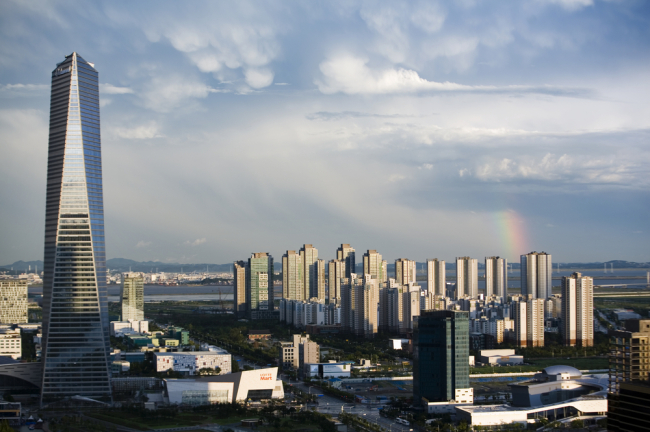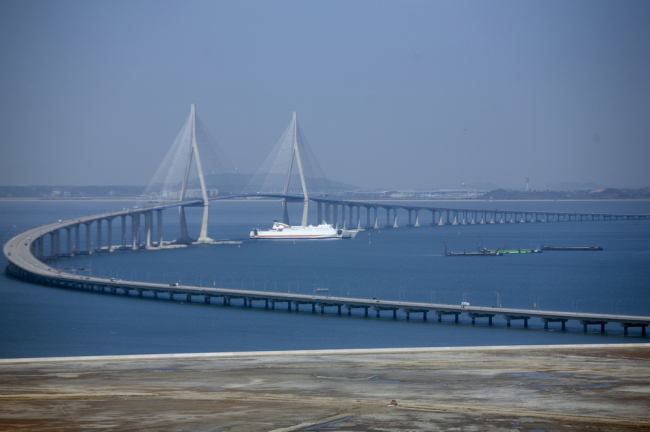With a population of 2.9 million, Incheon is Korea’s third-largest city and now the third Korean city to host the Asian Games.
The city has come a long way since the Joseon era, for most of which it was a relatively small town, and its leaders see a great future for the city.
“More than any other city, Incheon has potential for growth, and I think that national development cannot be achieved if Incheon can’t leap forward,” Incheon Mayor Yoo Jeong-bok said.
“Many plans are being formulated to realize that potential.”
Central to Incheon’s growth plan is the Free Economic Zone, which encompasses the areas of Cheongra, Songdo and Yeongjong.
The IFEZ was the first to be given free economic zone status in 2003, and since then has attracted a diverse range of international organizations, from corporations and U.N. bodies to hospitals and academic institutions.
Earlier this month, Ghent University of Belgium opened a branch in the IFEZ, becoming the first European school to establish itself in Korea.
In addition to the Belgian institution, the University of Utah of the U.S. also opened a branch in Songdo, bringing the number of foreign universities with a local branch here to four. The State University of New York at Stony Brook opened its Songdo campus in 2012, followed by George Mason University, also from the U.S., in March.
 |
Songdo International City (Incheon Free Economic Zone Authority) |
Among the reasons why the IFEZ is becoming a popular destination for international businesses and entities are its convenient transportation infrastructure and excellent living conditions, according to those working in the area.
It takes about 20 minutes to drive to Incheon International Airport, and one can fly to 61 Asian destinations, including Beijing and Tokyo, in less than three hours.
But Incheon’s role as Korea’s gateway to the world began long before air travel became commonplace.
Since its opening in the late 1880s, Incheon Port has allowed goods and people to move in and out of the country, and it continues to be one of Korea’s fastest-growing ports.
Incheon Port’s passenger terminal connects Korea to 10 Chinese ports, while its cargo terminal plays a key role in boosting international trade.
According to the Incheon Port Authority, Incheon Port saw the largest growth in terms of goods transported in and out of the country via shipping containers in 2013.
 |
Incheon Grand Bridge (Incheon Free Economic Zone Authority) |
The port also served to make Incheon more cosmopolitan long before the idea of multiculturalism even existed in Korea.
As one of the ports nearest to China, many Chinese immigrants settled in Incheon and formed the Chinatown that thrives to this day.
The settlement of Chinese immigrants in Incheon has not only changed the city, but has left a mark on Korean culture. Jajangmyeon, one of the most popular “Chinese” noodle dishes among Koreans, was born in Incheon.
With more than 60,000 foreign residents, Incheon has the second-largest non-Korean population among metropolitan cities after Seoul.
Although the city’s current name first came into use in 1413, Incheon’s history goes back much further as it had a part in events that played a critical role in shaping South Korea into the country that it is today.
Incheon’s Ganghwado Island is home to hundreds of dolmens estimated to have been built more than 2,000 years ago, indicating that the area was home to New Stone Age and Bronze Age cultures.
It what is now part of modern-day Incheon, the Chinese forces allied with Silla landed in A.D. 660. The Chinese support was pivotal to Silla ultimately unifying much of the Korean Peninsula. More recently, Incheon provided the in-route for the allied forces to turn the tide in the early days of the Korean War when U.S. General Douglas MacArthur led a successful amphibious attack behind North Korean lines on Sept. 15, 1950.
By Choi He-suk (
cheesuk@heraldcorp.com)

